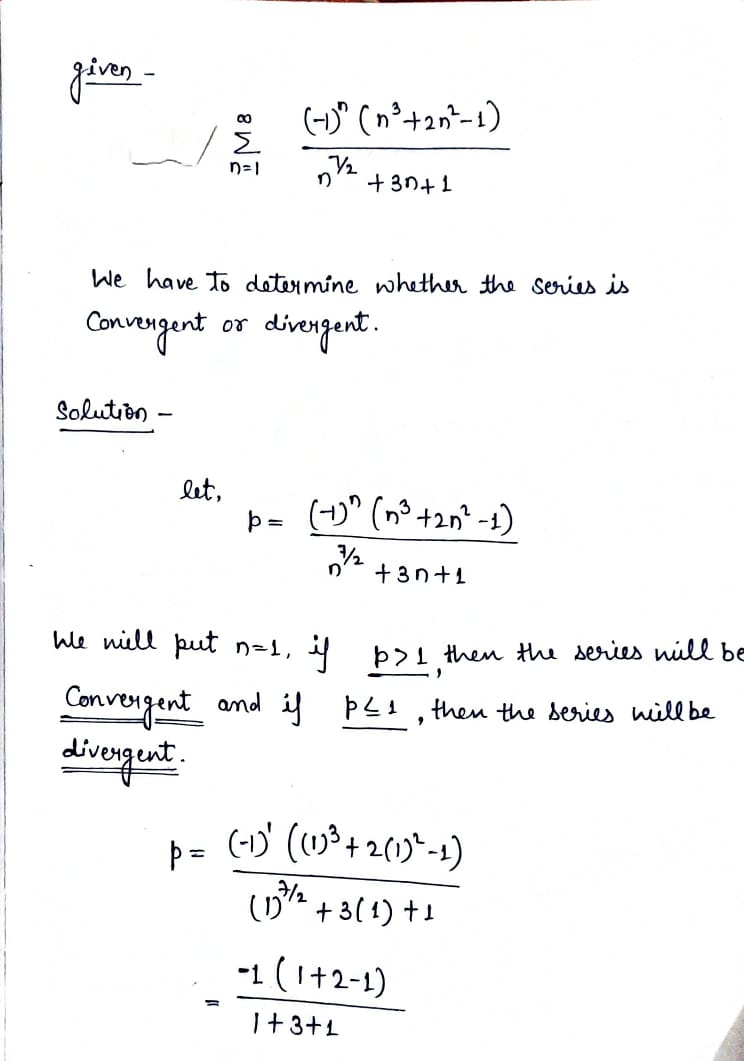T32. 32. Determine whether the following series converges absolutely, converges conditionally, or diverges. (-1)^(n³ + 2n² − 1) n7/2+3+1 M8 Σ n=1
T32. 32. Determine whether the following series converges absolutely, converges conditionally, or diverges. (-1)^(n³ + 2n² − 1) n7/2+3+1 M8 Σ n=1
Calculus: Early Transcendentals
8th Edition
ISBN:9781285741550
Author:James Stewart
Publisher:James Stewart
Chapter1: Functions And Models
Section: Chapter Questions
Problem 1RCC: (a) What is a function? What are its domain and range? (b) What is the graph of a function? (c) How...
Related questions
Question
100%
![**Problem 32:**
Determine whether the following series converges absolutely, converges conditionally, or diverges.
\[
\sum_{n=1}^{\infty} \frac{(-1)^n 7^n}{n^7 + 3n^2 - 1}
\]
---
**Explanation for Educational Context:**
The given series is an alternating series, which means it has terms that alternate in sign. The expression \((-1)^n\) ensures that the terms alternate. To analyze convergence, consider using tests for convergence of alternating series, such as the Alternating Series Test. Additionally, check if the series converges absolutely by considering the series with absolute values of its terms:
\[
\sum_{n=1}^{\infty} \frac{7^n}{n^7 + 3n^2 - 1}
\]
Absolute convergence can be analyzed using tests like the Ratio Test or Comparison Test.
When discussing the behavior of series for educational purposes, it's crucial to review the conditions under which each test applies and the interpretation of absolute vs. conditional convergence.](/v2/_next/image?url=https%3A%2F%2Fcontent.bartleby.com%2Fqna-images%2Fquestion%2F50335062-838e-41db-8290-10a35f7e308c%2F07417e0b-f646-4833-863f-b764faf8585c%2Fg3j4snj_processed.jpeg&w=3840&q=75)
Transcribed Image Text:**Problem 32:**
Determine whether the following series converges absolutely, converges conditionally, or diverges.
\[
\sum_{n=1}^{\infty} \frac{(-1)^n 7^n}{n^7 + 3n^2 - 1}
\]
---
**Explanation for Educational Context:**
The given series is an alternating series, which means it has terms that alternate in sign. The expression \((-1)^n\) ensures that the terms alternate. To analyze convergence, consider using tests for convergence of alternating series, such as the Alternating Series Test. Additionally, check if the series converges absolutely by considering the series with absolute values of its terms:
\[
\sum_{n=1}^{\infty} \frac{7^n}{n^7 + 3n^2 - 1}
\]
Absolute convergence can be analyzed using tests like the Ratio Test or Comparison Test.
When discussing the behavior of series for educational purposes, it's crucial to review the conditions under which each test applies and the interpretation of absolute vs. conditional convergence.
Expert Solution
Step 1

Step by step
Solved in 2 steps with 2 images

Recommended textbooks for you

Calculus: Early Transcendentals
Calculus
ISBN:
9781285741550
Author:
James Stewart
Publisher:
Cengage Learning

Thomas' Calculus (14th Edition)
Calculus
ISBN:
9780134438986
Author:
Joel R. Hass, Christopher E. Heil, Maurice D. Weir
Publisher:
PEARSON

Calculus: Early Transcendentals (3rd Edition)
Calculus
ISBN:
9780134763644
Author:
William L. Briggs, Lyle Cochran, Bernard Gillett, Eric Schulz
Publisher:
PEARSON

Calculus: Early Transcendentals
Calculus
ISBN:
9781285741550
Author:
James Stewart
Publisher:
Cengage Learning

Thomas' Calculus (14th Edition)
Calculus
ISBN:
9780134438986
Author:
Joel R. Hass, Christopher E. Heil, Maurice D. Weir
Publisher:
PEARSON

Calculus: Early Transcendentals (3rd Edition)
Calculus
ISBN:
9780134763644
Author:
William L. Briggs, Lyle Cochran, Bernard Gillett, Eric Schulz
Publisher:
PEARSON

Calculus: Early Transcendentals
Calculus
ISBN:
9781319050740
Author:
Jon Rogawski, Colin Adams, Robert Franzosa
Publisher:
W. H. Freeman


Calculus: Early Transcendental Functions
Calculus
ISBN:
9781337552516
Author:
Ron Larson, Bruce H. Edwards
Publisher:
Cengage Learning